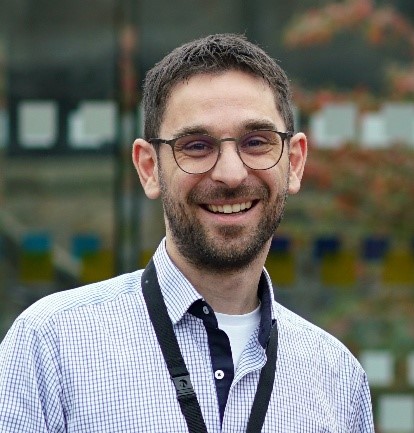Despite its deep spiritual roots, music therapy has rarely explored spirituality through research. With a small grant from the Music Therapy Charity, Dr. Giorgos Tsiris conducted the first systematic review of empirical studies on music therapy and spirituality. His findings revealed a narrow evidence base—mostly adult-focused, culturally limited, and centred on oncology and palliative care.
Giorgos’s work has sparked critical conversations about inclusivity, ethics, and the assumptions we bring to spirituality and music therapy practice. His research has informed teaching, international collaborations, and a forthcoming book on music, death, and spirituality. The Music Therapy Charity’s grant supported this pioneering work, helping to expand the field’s understanding of spirituality and draw future research directions.
Featured in the Music Therapy Handbook (2nd ed.), 2025
Despite the rich spiritual roots of many contemporary music therapy approaches, spirituality remains an underexplored research area. The number of published studies involving human participants is limited, and their conceptual, methodological and cultural diversity seems narrow. There was a need for a critical review of the existing evidence base to understand potential trends and gaps, and to inform future research directions.
Adopting a critical stance towards the spiritual discourse in the field, my study provided an overview of the existing research literature on music therapy and spirituality. Instead of assessing ‘effectiveness’ – a concept which can be problematic in music therapy’s exploration of spirituality – this systematic review focused on trends and gaps of the evidence base in terms of authorship characteristics, methodological choices, and foci.
The literature search focused on scholarly research publications such as journal articles, theses and dissertations. Any publication written in English was included. Clinical case studies, position papers and previous literature reviews were excluded to enable a focus on empirical research involving directly human participants. Collected studies were reviewed using thematic analysis and descriptive statistics to identify emerging themes, trends and patterns in the literature.
I identified 30 music therapy studies on spirituality. All studies were published after 2002, and over half of were based on master’s or doctoral projects.
These studies focused on three key areas: (1) the relationship between music therapists’ spirituality and their clinical practice, (2) the effect or impact of music therapy on clients’ spirituality, and (3) clients’ and/or their families’ experiences of spirituality in music therapy.
Only 10% of the studies had an interdisciplinary focus and all of them were specific to music therapy and spiritual care. In most instances, studies offered participants working definitions where spirituality appeared to be framed as something ‘positive’.
Most studies focused on oncology or hospice settings. Only two studies had non-adult participants. Samples tended to be culturally homogeneous, with the United States (54%) being the predominant country.
The insights gained from this study have informed my teaching and education work nationally and internationally. The identified trends and gaps have resonated with recent developments around anti-oppressive practices in the profession, and I have contributed to various professional forums. I am currently co-editing a new book on music, death and spirituality where the study’s results continue to offer a critical lens for our exploration and understanding of the existing evidence base.
This study was the first of its kind, and the findings have raised directions and questions for future research. This includes a call for research in relation to diverse music therapy settings (beyond oncology or palliative care) and client age groups.
The study has promoted a more critical engagement with conceptual, professional, and ethical issues pertaining to spirituality. By questioning assumptions around our working definitions of spirituality and their potential oppressive implications, the study has encouraged more open-ended and inclusive approaches in music therapy practice, research and theory.
Dr Giorgos Tsiris is Director of Education, Research and Creative Arts at St Columba’s Hospice Care, and Senior Lecturer in Music Therapy at Queen Margaret University. In 2019, he co-edited the special journal edition of Approaches on “Exploring the spiritual in music: Interdisciplinary dialogues in music, wellbeing and education“.

